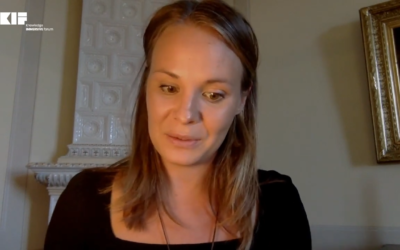Rev Labaredian : When the internet was first conceived – and it was built starting in the 70s – the original pioneers, the ones that founded it and laid down the foundation of all the protocols and the standards, really believed that everyone that’s connected to the internet should be equal. That every server, every person, every workstation that’s connected can both serve and receive.
Yeah, it can go in both directions. Years later, when the web was formed, it was built on that technology, but also that philosophy. The central technology to the World Wide Web, html, http, all of these standards that we take for granted right now, were built around this idea that everybody can contribute and everybody has an equal access to building their piece of it.
And as a result, we’ve gone from the internet and the web in the early 90s being, you know, relatively niche thing that only some government agencies and universities had access to, to it being a part of our life everywhere in the world, billions of people are on it.
We need to do the same for the metaverse. If we build a metaverse without open standards, without giving everybody access to contribute to it, then it’s not going to be, it could be a pretty dangerous experience actually for most people.
What we really need to do this time is have governments, have the public sector and everybody involved in building this and carve out spaces that are open to the public. Even more so now because it’s not just text and 2D pages, we’re actually going to have the equivalent of spaces like we do in this reality, inside the virtual world. And in those spaces, we’re going to need things like parks and libraries, all the things that we all love and enjoy from our public common spaces with each other.
It’s critical that we all participate, not just have a few islands of information.
Alexandre Michelin : Thank you, Rev; thank you so much. Thank you so much for waking up so early and to join us.
Je vais synthétiser. C’est un peu le même message que celui que transmettait Marc hier. Et c’est intéressant que deux des plus grandes boîtes le partagent. C’est-à-dire qu’on ne peut pas construire ça tout seul.
Deuxièmement, il y a des risques réels. On n’est pas naïfs. On sait ce que ça représente, s’il y a un métaverse c’est une dictature, en plus par l’imaginaire et le visuel et l’émotionnel…
Clara Schmelck : Et qui incorpore en quelque sorte, qui prend vraiment tout le corps.
Alexandre Michelin : Voilà, qui prend tout le corps.
Gaspard Giroud : C’est ça. On est complètement engagés physiquement dedans, donc…
Alexandre Michelin : Voilà. Ce qu’on a compris de la première révolution de l’internet, on doit essayer d’en tirer des leçons aujourd’hui ?
Gaspard Giroud : Je pense que c’est particulièrement intéressant, par exemple pour les gens qui sont des parents, d’imaginer que leurs enfants vont grandir là-dedans.
Alors effectivement, est-ce qu’on préfère que monde diversifié, qu’il n’y ait pas qu’une seule société qui en soit propriétaire, comment est-ce qu’on construit ensemble.
Je pense que Nvidia comme Epic Games n’arrêtent pas de tendre les mains un petit peu à tout le monde pour dire : “écoutez, essayons de faire ça le mieux possible.”
Présentateur : Alexandre Michelin
Intervenants :
- Clara Schmelck (philosophe, journaliste, prof à Sciences Po Strasbourg)
- Gaspard Giroud (Fondateur et CEO de Garou)
- Rev Labaredian (Vice Président de NVIDIA)
- Bertrand Nepveu (Fondateur de VRvana)



